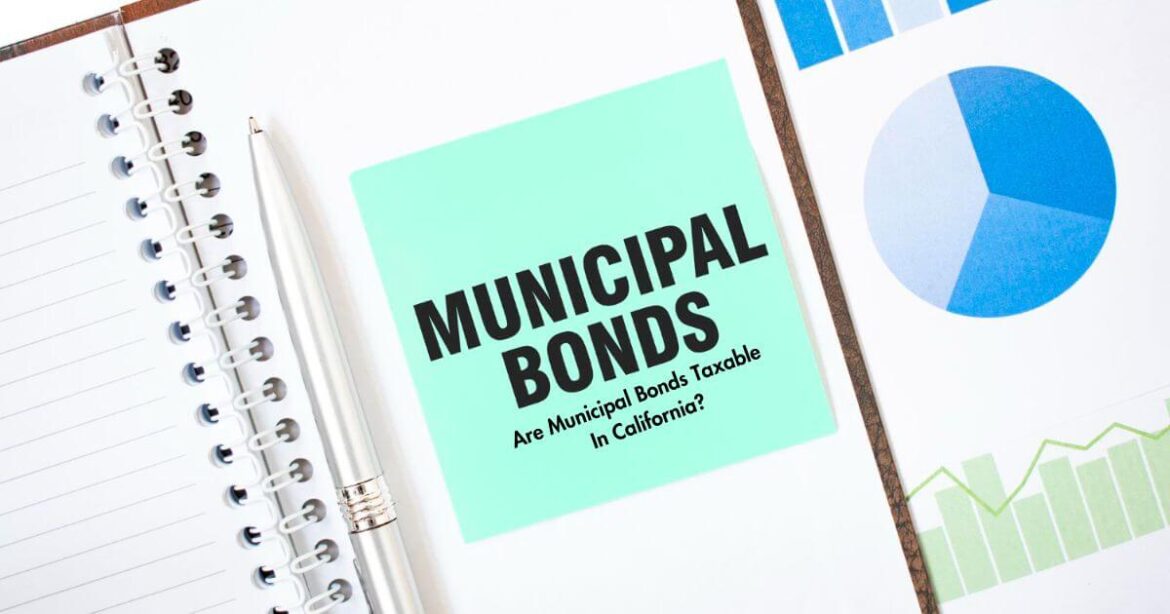Last Updated on December 28, 2025 by Amrita Das
Are municipal bonds taxable in California? There is no straight answer because whether it is taxable or completely tax-free depends on the bond’s characteristics, your residency, and other factors. However, the Internal Revenue Service (IRS) grants tax-exempt status to municipal bonds under certain conditions.
In general, interest earned on municipal bonds is exempt from federal income tax if they are issued by state or local governments and used to finance public projects. These tax breaks encourage investors to finance critical infrastructure projects that benefit their communities.
While municipal bonds are exempt from federal taxes, they may still be subject to state and local taxes. Let’s explore the details of municipal bond taxation in California to understand the situation better.

Read Also: How To Avoid Paying Taxes On Settlement Money?
Municipal Bonds Overview
Before going into the detailed discussion, let’s have an idea about municipal bonds. Municipal bonds, often known as munis, are a type of debt security utilized by counties, municipalities, and states to finance capital expenditures.
These bonds typically offer federal income tax exemption, although they may be subject to taxation at state or local levels based on specific circumstances.
Essentially, when individuals purchase municipal bonds, they effectively lend money to the bond issuer in exchange for a predetermined number of interest payments over a specified period.
The bond’s maturity date marks the end of this period and signifies the return of the full investment amount to the investor. Due to their tax-exempt nature, municipal bonds are particularly favored by individuals in higher income tax brackets.
Different Types Of Municipal Bonds
General Obligation Bonds (GO)
A General Obligation bond, commonly known as a GO bond, is issued by governmental entities and is not backed by revenue from a specific project.
These bonds are typically supported by the full faith and credit of the issuing municipality, meaning they have the ability to raise taxes or cut spending in order to make interest and principal payments. Some GO bonds may also be secured by dedicated property taxes, making them even more secure for investors.
While these bonds carry a lower risk for investors due to their backing by a government entity, they also tend to offer lower yields compared to other types of municipal bonds.
Revenue Bonds
Revenue bonds are secured by the revenue generated from a specific project or source, such as toll roads, fuel taxes, or hotel occupancy taxes. Unlike GO bonds, revenue bonds do not rely on the issuer’s ability to raise taxes in order to make payments.
Instead, they are supported by the income generated from the designated source.
However, this also means that if the project or source of revenue fails to generate enough income, it could impact the issuer’s ability to make interest and principal payments on these bonds. As a result, revenue bonds tend to carry a higher risk for investors but also offer potentially higher yields.
Conduit Bonds
Conduit bonds are issued by municipalities on behalf of a third party borrower, such as a private company or non-profit organization. These bonds do not have the full faith and credit backing of the issuing municipality but instead rely solely on the creditworthiness of the borrower.
The income generated from these bonds goes directly to the third party borrower, who then uses it for their own projects or purposes.
Conduit bonds may offer tax advantages for investors, depending on the type of project they finance, but they also carry a higher risk due to their dependence on the success of the borrower’s projects.
Understanding Exempt Facility Bonds
Exempt facility bonds are a type of tax-exempt financing that allows non-governmental entities to use bond proceeds for defined qualified purposes within publicly-owned facilities.
This type of financing is commonly used for projects such as local utility facilities, solid and hazardous waste disposal facilities, and other types of government-owned infrastructure.
Examples of Projects Financed with Exempt Facility Bonds
One common example of a project financed with exempt facility bonds is the construction of public airport facilities. These facilities, such as terminals, hangars, and aircraft repair buildings, are often leased or made available on a long-term contractual basis to air carriers for passengers or freight.
Other examples of projects that may qualify for tax-exempt financing include docks and wharves, mass commuting facilities, water and sewage facilities, and public educational facilities.
Qualifications for Exempt Facility Bonds
In order to be eligible for tax-exempt financing under the exempt facility bonds category, projects must meet certain criteria. First, the project must be open to use by the general public.
This can be achieved if the project is a common carrier, providing transportation services on a non-discriminatory basis, or if it is otherwise open to the public (such as a public airport terminal). Additionally, the project must be owned by a governmental unit, which is typically the entity in charge of operating and maintaining the facility.
Benefits of Exempt Facility Bonds
There are several benefits to using exempt facility bonds for financing projects. The most obvious benefit is the tax-exempt status, which allows borrowers to save money on interest payments over the life of the bond. This can result in significant cost savings for large-scale projects.
Additionally, exempt facility bonds often have lower interest rates compared to traditional loans, making them an attractive option for financing infrastructure projects. Finally, utilizing tax-exempt financing can also help promote economic development and job creation within the community.
Are Municipal Bonds Taxable In California?

Interest earned on certain private activity bonds in California may be subject to federal and state income taxes. Private activity bonds are issued by local or state governments to finance projects for the benefit of private entities, such as hospitals or housing developments.
In addition, if a California resident invests in out-of-state municipal bonds, they may also be subject to California state taxes on those interest payments. Also, if you are not a resident of California and earn interest on municipal bonds issued by the state, you may be subject to state income taxes in your home state.
Finally, if a bond is purchased at a discount or with accrued interest, the difference between the purchase price and the face value of the bond may be subject to federal and state income taxes. This is known as “original issue discount” and it applies to both taxable and tax-exempt municipal bonds.
Read Also: Short Term Rental Tax Loophole: Maximize Your Tax Savings
Tax-Exempt Status Of Municipal Bonds In California
The tax-exempt status of municipal bonds can be affected by several factors, including the issuer, use of proceeds, your residency, and whether the bond is taxable or tax-exempt. It’s important to consider these factors when evaluating the potential benefits and risks of investing in municipal bonds.
The Issuer
Municipal bonds issued by state or local governments are generally exempt from federal income taxes. However, private activity bonds may not qualify for this exemption. These types of bonds are used to finance projects that involve private entities, such as airports or utility facilities, and therefore may not be tax-exempt.
Use of Proceeds
Municipal bonds must be used to finance public projects, such as building schools, roads, or other infrastructure. If the proceeds are used for private purposes, the interest earned may be subject to federal and state income taxes. It’s important to carefully review the use of proceeds for a specific bond before investing.
Your Residency
Residents of a particular state can benefit from the tax-exempt status of both state and local government issued bonds within that state. However, non-residents may still be subject to taxes in their home state.
This is an important consideration when choosing which municipal bonds to invest in, as it may impact the overall tax benefits of the investment.
Taxable vs Tax-Exempt Bonds
While most municipal bonds are tax-exempt, some may be taxable at both the federal and state levels. It’s important to carefully review a bond’s prospectus or consult with a financial advisor to understand its tax implications. In general, taxable bonds may offer higher interest rates but also come with potential tax implications for investors.
How Are Municipal Bonds Taxed?
As you know, municipal bonds are generally exempt from federal income tax and, in some cases, state and local income taxes as well. This makes them attractive investments for individuals seeking to minimize their taxable income. However, there are certain tax implications to consider when investing in municipal bonds.
Potential Tax Implications
While the interest earned from municipal bonds may be exempt from federal income tax, there are still potential tax implications that investors should be aware of. Some key factors to consider include capital gains, alternative minimum tax, and the tax efficiency of managed municipal bond investments.
Capital Gains
If an investor sells their municipal bond investment at a profit, those capital gains may be subject to taxation as either short- or long-term capital gains, depending on how long the investment was held. This can have an impact on the overall tax liability for investors.
Alternative Minimum Tax
Investors who are subject to the alternative minimum tax (AMT) may also need to report income from certain types of private-activity bonds as taxable income. These bonds are used to finance projects that provide benefits to private companies and are identified as such in their prospectuses.
Tax Efficiency of Managed Investments
While managed investments offer the advantages of professional management and diversification, actively managed mutual funds may generate taxable capital gains that can offset the potential tax benefits of municipal bond investing.
It’s important to consider the tax efficiency of a managed investment before making a decision.
Benefits Of Investing In California Municipal Bonds

Tax Advantages
One of the key benefits of investing in California municipal bonds is its tax-exempt status. This means that investors do not have to pay federal income taxes on the interest earned from these bonds.
While some specific bonds may not be exempt, most California municipal bonds offer this advantage, making them an attractive option for high-income individuals looking to minimize their tax burden. Additionally, these bonds are also exempt from state income taxes for California residents.
Stable Income Stream
Another advantage of investing in California municipal bonds is the predictable and steady stream of interest payments they offer. As these bonds typically have a fixed interest rate, investors can rely on a consistent income stream that is not affected by market fluctuations.
This makes them a popular choice among retirees and other investors looking for a stable source of income.
Supporting Infrastructure
Beyond their financial benefits, investing in California municipal bonds also has a positive impact on the state’s infrastructure. The funds raised from these bonds are used to support various projects, such as building and maintaining roads, schools, and public transportation systems.
By investing in these bonds, individuals can contribute to the development and improvement of their local communities and the state as a whole. This adds a sense of social responsibility to the financial benefits of investing in California municipal bonds.
Read More: What Is Berkheimer Tax? A Comprehensive Guide
Are Municipal Bonds Taxable In California: FAQs
Q.1: Are municipal bonds tax free in USA?
No, municipal bonds are not completely tax-free in the USA. However, they may be exempt from federal income tax and some state and local taxes if certain conditions are met.
Q.2: Are California municipal bonds safe?
Municipal bonds issued in California are generally considered safe investments. They are backed by the full faith and credit of the issuing municipality, which means that the issuer is legally obligated to repay the bondholders.
Q.3: Are municipal bond funds considered risky?
Municipal bond funds are generally considered low-risk investments, but this may not always be the case. Some types of municipal bonds, such as high yield bonds, can carry a higher level of risk for investors. It’s important for investors to thoroughly research and evaluate the specific bonds they are considering or currently own to determine their level of risk.
Q.4: What are tax-exempt bonds in USA?
Tax-exempt bonds are issued by state and local governments to fund public projects such as infrastructure improvements. The interest earned from these bonds is exempt from federal income tax, making them attractive to investors seeking tax-free income.
Q.5: Can Non-Residents Purchase US Municipal Bonds?
Investing in municipal bonds issued by state and local governments in the United States is not limited to US citizens. Even non-residents are allowed to buy these types of bonds. However, there are certain tax implications and restrictions that may apply to them.
Q.6: How to buy municipal bonds in California?
Investors in California can purchase municipal bonds through brokers who submit orders based on interest rates and prices. Once the bond sale is completed, finalized interest rates and prices are determined the following day. This process allows for specific amounts and maturity dates to be chosen by investors.
Read Also: Tax Implications Of Selling A House Below Market Value
Are Municipal Bonds Taxable In California? Conclusion
While municipal bonds are not entirely tax-free in California, they still offer significant tax advantages compared to other investment options. It’s essential to understand the different types of municipal bonds and their taxation rules to make informed decisions about your investments.
If you are a California resident, it’s crucial to consider the tax implications when choosing which municipal bonds to invest in. And if you reside outside of California, remember that federal taxes will still apply to your earnings from these investments.
Ultimately, municipal bonds can be an excellent addition to any investment portfolio, providing stability, tax benefits, and a way to contribute to the development of your community.
One thing to always keep in mind it is great to consult with a financial advisor to make any investment decisions to ensure that your selected investment aligns with your overall financial goals and risk tolerance.
Hence, if you are considering investing in municipal bonds in California, do your research and seek professional advice for a well-informed decision.
Reference Link:
https://www.ibank.ca.gov/bonds/exempt-facility-bonds/
https://www.investopedia.com/ask/answers/060215/how-are-municipal-bonds-taxed.asp
